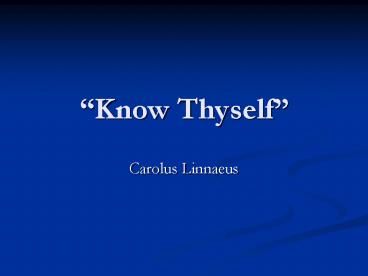- PowerPoint PPT Presentation
Title:
Description:
... Racism and Uncertainty Human origins commonly at center of the Evolution vs. Creation debate Evolution and human origins are investigated scientifically ... – PowerPoint PPT presentation
Number of Views:39
Avg rating:3.0/5.0
Title:
1
Know Thyself
- Carolus Linnaeus
2
Human OriginsA Confluence of Research
- Paleontology
- Anthropology
- Archaeology
- Genetics
- Paleoclimatology
3
Conflict, Racism and Uncertainty
- Human origins commonly at center of the
Evolution vs. Creation debate - Evolution and human origins are investigated
scientifically hypotheses are proposed and
tested - Creationism/Creation Science/Intelligent Design,
etc. are faith, not science - Topic is full of uncertainty
- A) Very young discipline
- B) Relatively sparse fossil record
4
A Family Dynasty the Leakeys Louis, Richard,
Mary and Richard Jr.
- Mary Leakey - A lifetime of contributions
including - Many first discoveries of skulls, etc.
- First hominid footprints
5
A Patchy Fossil Record
- Upland habitat erosion vs. deposition
- Fossils are not abundant
- Most important sites are in Tanzania, Kenya,
Ethiopia (East African Rift System) and Egypt - Teeth predominate
- Jaw and skull fragments
- Taphonomic changes make taxonomy difficult
- Rare post-cranial skeleton
- Few complete or nearly complete skeletons
- Footprints
6
The Cradle of Humanity
- The East African Rift System
- Earthquakes and formation of rift as Africa
splits - Sinking of rift floor promoted accumulation of
sediments - Early hominids preserved in these sediments
- Recent erosion cuts through sediments to reveal
fossils
7
Famous locationsof hominid fossils
- Olduvai Gorge
- Hadar
- Laetoli
8
Arboreal Ancestors?
- Characteristics of tree dwellers
- Flexibility and agility
- Parallax vision eyes in front of head
- Vision predominates over sense of smell
- Enlarged brain to handle visual data
- Secondary adaptations to bipedality (from tree
swingers)
9
Of Apes and Man
- Divergence in Early Cenozoic Oligocene?
- Apes and Hominids
- More gap than record
- Too early to establish evolutionary relationships
among species - Discovery of each new species changes picture
- So, what is a hominid?
10
Characteristics of Hominids(a.k.a. hominins)
- Arched palate
- U shaped jaw
- Uniform dentition (no diastema)
- Enlarged skull and brain case
- Opposable thumb
- Bipedal
- Paralax vision
11
Australopithecus afarensis Lucy
- Circa 3.8 Ma Pliocene to Pleistocene (?)
- Female
- Four feet tall
- Less than 100 lbs.
- Tool user, but not maker
- Coexisted with A. robustus
- Upright posture and bipedality arise before
enlargement of braincase
12
Australopithecus afarensis
13
Footprints at Laetoli, Tanzania(3.6 Ma)
probable A. afarensis
14
Australopithecus afarensis and Homo habilus
15
One Version of the Time Line
16
General Picture ofHominid Evolution
- Probable common ancestor of humans and chimps
circa 5.5 Ma - Pliocene saw several hominid species coexising
- Several lineages became extinct
- Which one was our ancestor?
17
Kenyanthropus platyops an early ancestor to
rival A. afarensis?
- Mid-Pliocene (circa 3.5 Ma)
- Some similarities to Homo (Kenyanthropus)
rudolfensis - Coeval with A. afarensis
- More modern appearances millions of years
earlier than previously thought - Possibly incorrect taphonomic distortion?
18
General Picture ofHominid Evolution
- Genus Homo arises circa 2.0 Ma (H. habilus) -
Pleistocene - H. habilus a tool maker and user, fire, built
shelters, social structure - H. sapiens arises circa 500,000 to 300,000 ybp
(Late Pleistocene) - Modern Humans arise about 100,000 ybp
19
The Hominid Time Line
- Accurate dating of fossils is critical
- Direct evolutionary relationships are still
unclear - New fossil discoveries prompt revisions all the
time - The burning questions Who are we? What is our
heritage? Where do we fit in the grand scheme of
things?

